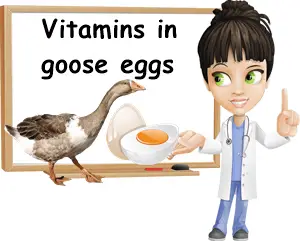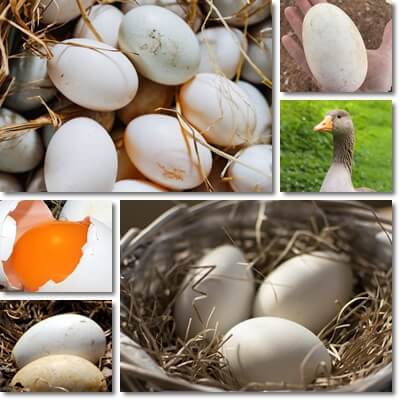Goose eggs are not the type of eggs to eat everyday, but they are one of the healthiest eggs you can eat. Packed with nutrition, goose eggs put to shame other egg varieties. Granted, their nutritional value is owed, at least in part, to being larger than other egg varieties such as chicken, turkey and duck eggs. Nonetheless goose eggs boast a high nutrition density when it comes to most essential vitamins and minerals, and have a high protein content.
Goose eggs nutritional value overview
Goose eggs are a variety of edible eggs laid by geese. Goose eggs are high in protein, high in fat, high in cholesterol and high in calories, but very low carb. Goose eggs have no dietary fiber, no vitamin C and only trace amounts of vitamin K. However, they are high in iron, potassium, phosphorus and selenium, and have smaller amounts of sodium, calcium, magnesium, copper and zinc, and trace amounts of manganese. Vitamins in goose eggs include vitamin A, all B complex vitamins, namely vitamins B1, B2, B3, B5, B6, B7 (biotin), B9, B12, choline, and small amounts of vitamin D and vitamin E.

Goose eggs nutrition facts per 100 g
- Energetic value (calories): 185 kcal (kilocalories)
- Carbohydrates content: 1.35 g (grams)
- Sugar: 0.94 g
- Fiber content: 0 g
- Protein content: 13.87 g
- Total fat content: 13.27 g
- Saturated fat: 3.595 g
- Monounsaturated fat: 5.747 g
- Polyunsaturated fat: 1.672 g (including Omega-3 fatty acids)
- Cholesterol: 852 mg (milligrams)
- Water content: 70.4 g
Vitamins in goose eggs:
- Vitamin B1: 0.147 mg (milligrams)
- Vitamin B2: 0.382 mg
- Vitamin B3: 0.189 mg
- Vitamin B5: 1.759 mg
- Vitamin B6: 0.236 mg
- Vitamin B9: 76 mcg (micrograms)
- Vitamin B12: 5.1 mcg
- Choline: 263.4 mg
- Vitamin C: 0 mg
- Vitamin D: 1.7 mcg
- Vitamin E: 1.29 mg
- Vitamin K: 0.4 mcg
- Vitamin A: 187 mcg (micrograms) from retinol and pro-vitamin A antioxidants (carotenes)
- Retinol (preformed vitamin A): 185 mcg
- Pro-vitamin A antioxidants: beta-carotene (13 mcg), beta-Cryptoxanthin (12 mcg)
- Antioxidants without vitamin A activity: lutein and zeaxanthin (442 mcg)
Minerals in goose eggs:
- Calcium: 60 mg (milligrams)
- Copper: 62 mcg (micrograms)
- Iron: 3.64 mg
- Magnesium: 16 mg
- Manganese: 0.038 mg
- Phosphorus: 208 mg
- Potassium: 210 mg
- Selenium: 36.9 mcg
- Sodium: 138 mg
- Zinc: 1.33 mg

Goose eggs nutrition facts per egg
- Energetic value (calories): 266 kcal (kilocalories)
- Carbohydrates content: 1.94 g (grams)
- Sugar: 1.35 g
- Fiber content: 0 g
- Protein content: 20 g
- Total fat content: 19 g
- Saturated fat: 5.18 g
- Monounsaturated fat: 8.28 g
- Polyunsaturated fat: 2.41 g (including Omega-3 fatty acids)
- Cholesterol: 1230 mg (milligrams)
- Water content: 101 g
Vitamins in goose eggs:
- Vitamin B1: 0.212 mg (milligrams)
- Vitamin B2: 0.55 mg
- Vitamin B3: 0.272 mg
- Vitamin B5: 2.53 mg
- Vitamin B6: 0.34 mg
- Vitamin B9: 109 mcg (micrograms)
- Vitamin B12: 7.34 mcg
- Choline: 379 mg
- Vitamin C: 0 mg
- Vitamin D: 2.45 mcg
- Vitamin E: 1.86 mg
- Vitamin K: 0.576 mcg
- Vitamin A: 269 mcg (micrograms) from retinol and pro-vitamin A antioxidants (carotenes)
- Retinol (preformed vitamin A): 266 mcg
- Pro-vitamin A antioxidants: beta-carotene (18.7 mcg), beta-Cryptoxanthin (17.3 mcg)
- Antioxidants without vitamin A activity: lutein and zeaxanthin (636 mcg)
Minerals in goose eggs:
- Calcium: 86.4 mg (milligrams)
- Copper: 89 mcg (micrograms)
- Iron: 5.24 mg
- Magnesium: 23 mg
- Manganese: 0.055 mg
- Phosphorus: 300 mg
- Potassium: 302 mg
- Selenium: 53.1 mcg
- Sodium: 199 mg
- Zinc: 1.92 mg
The estimated average weight of one goose egg is 144 grams to 150 grams. However, goose eggs can vary in size depending on the goose laying the egg, its age, diet, and species. As a result, exact weight can range from as little as 110 grams per egg to as much as over 220 grams per egg. Find out more about the benefits of goose eggs.
Observations regarding goose eggs nutrition
Goose eggs nutrition is impressive. Eating one whole goose egg at an average estimated weight of 144 grams per egg provides you the following nutrition:
- 40% of all the protein you need in a day (the average adult needs 50 grams of protein per day).
Bonus: it’s high-quality protein, complete with all essential amino acids. - 19 grams of fat out of a total allowed daily intake of 78 grams of fat.
- Less than 2 grams of carbs – the average adult on a 2000 kcal diet can consume up to 275 grams of carbs everyday.
- 29% of all the iron you need in a day (the average adult needs 18 mg of iron every day).
- Over 40% of all the phosphorus you need in a day (the average adult needs 700 mg of phosphorus every day).
- 96.5% of all the selenium you need in a day (the average adult needs 55 micrograms of selenium every day).
- 6.4% of your daily potassium requirements (the average adult needs 4700 mg of potassium daily).
- About 18% of all the vitamin B1 (thiamine) you need in a day.
- About 45% of all the vitamin B2 (riboflavin) you need in a day.
- Around 50% of all the vitamin B5 (pantothenic acid) you need in a day.
- 20% of all the vitamin B6 you need in a day.
- 27% of your daily requirements of vitamin B9 (folate).
Folate is good for pregnant women because it helps with the normal development of the baby’s brain and nervous system during pregnancy. - Over 3 times all the vitamin B12 you need in a day.
Vitamin B12 helps insulate the myelin sheath surrounding the tail of nerve cells. - 4 times your daily cholesterol intake.
- 636 micrograms of lutein and zeaxanthin with benefits for eyesight.
- Over 29% of all the vitamin A you need in a day. Bonus: Almost all the vitamin A in goose eggs is preformed, in the form of retinol.
- 77% of your daily requirements of choline for brain health.
- 12% of your daily vitamin D requirements for better immunity and benefits for fertility, especially fertility in women.
